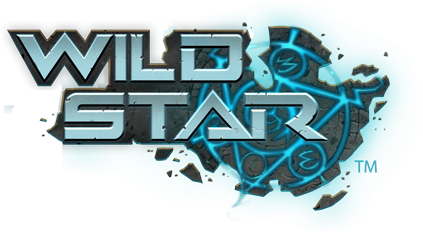I have a sympathy for the death of a game.
MMOs shut down all the time. It’s just the end of a commercial entity, to be purely hypothetical about it. Commercial entities end all the time. Shut down and vaulted because of their market demographic, or disbanded when the contracts end. An actor gets too old or an audience stops caring or a production venue is demolished.
The end of a game is different from the end of a story or a book or a tv series, because much more than those other things, to make the game function you have to put something of yourself in them. To play is to create. To play together is to create together. MMOs ask us to come in, to join with one another, and to play with not just a few friends, but with a world’s worth of friends. MMORPGs are big enough that they can have strangers in them, not just lone wanderers you don’t get to know, but people going about their day and having friends and meeting and they’re able to do it in the space right next to yours, and you don’t have to know them.
And what they create, their world, and their place in it, influences your world.
You all create together, a little bit at a time.
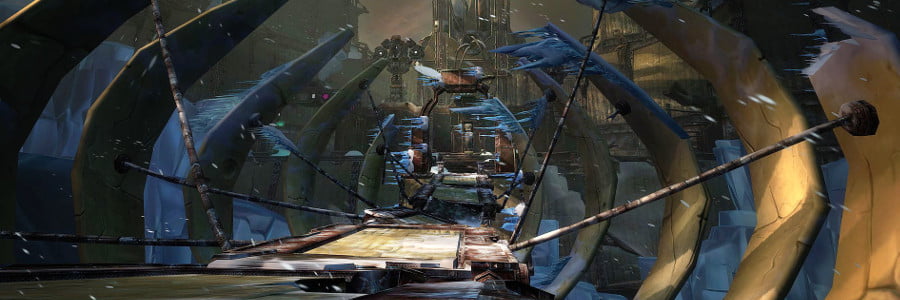
To stand here over the corpse of this place and talk about its failings is both outcome-driven and risks being churlish. I want to talk about this game, I want to talk about things that this game wanted to do and things it tried to do and I want to do that, but I want to do it talking about a game that is and now I can’t, because Wildstar is a game that was.
One of the most satisfying things about MMOs, from a hacky critical perspective, is a kind of tangible and useless feedback. MMO populations work as a barometer for the nebulous ‘success’ of the MMO, and since these systems are both inscrutable and generate a lot of public response (forums, tweets, reddit) it’s easy to find support and symptom just by looking hard enough.
As a critic, literally anything that happens in an MMO can be seen as directly linked to what you wanted or what you hated, and it doesn’t take a particularly difficult bit of journalitsic jiggery-pokery to make it sound serious and thoughtful. Right now, the fact that my main experience of Wildstar was ‘I didn’t like it,’ and Wildstar is shutting down, serves as a perfect, simple, basic template for my critique: Wildstar didn’t appeal to me enough, so it died.
These kind of conversations cropped up a lot while City of Heroes was live, but stopped sharply afterwards. Every change needed to be implemented for the good of the game, to make good on the promise of what the game wanted to be, as long as the game was still going. Once the shutdown announcement was made, and it was sudden, every one of those conversations shut up. We were actively and aggressively campaigning to keep this game, and we did it through ridiculous means. It was no longer time to complain about how the boat was painted, because the boat was sinking.
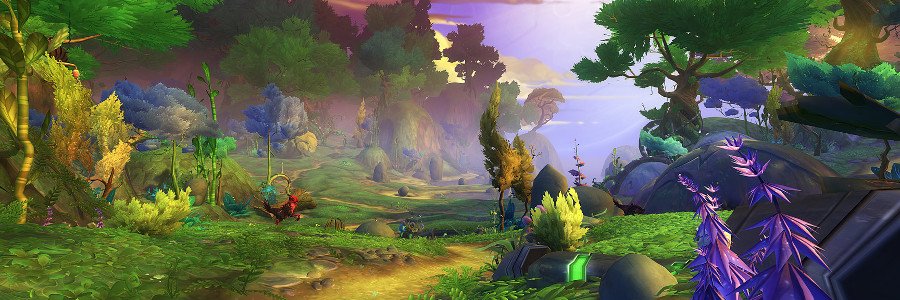
These things aren’t really related to how well a game does, how it lives or it dies. We feel like they are, but it really isn’t how it works. The actual content of an MMO, in my opinion, the systems and design and aesthetic and all, aren’t really the factors of its survival as much as the audience reaching the critical mass for that game’s cost, and that cost is really variable. Indeed a lot of invested people arguing back and forth about the state of the game is itself a kind of a sign of health because it indicates you have people engaged.
Consider Star Wars: The Old Republic, which cost $200 million to make, and which boasted a million subscribers in the first month. That number cratered so hard the game shifted to Free-To-Play model in less than nine months, which is concerningly quick. Normally when a game with that kind of initial outlay that went so far over-budget – the game was given ‘only’ $80 million to start with – you’d expect a company owning the game to memory-hole it when it failed to return on that investment in a timely fashion.
But Star Wars is spending Mouse Money and it seems the company that could give Disney Infinity three attempts to be Skylanders was willing to give The Old Republic seven years of chances to become World of Warcraft. It has stabilised, by the way, with a user base somewhere comparable to City of Heroes.
Now you mention it, City of Heroes by contrast, had a stable, profitable user base that was pretty comparable to its peak numbers (something like a third of its highest point, which isn’t an unreasonable plateau). It’s well-accepted (though by no means proven) that the game could have existed completely independently and turned a profit sufficient to support its own growth and development. The real issue was that the people with their hands on the purse strings in this case were, well, renowned MMO Mismanager and serial earth scorcher, NCSoft.
NCSoft, who attempted to cross-market games like Korean fan fave Aion with its low-ping PVP-focused grinds into a western market. NCSoft, who shut down Auto Assault after one year total. NCSoft, who killed Master X Master so fast (six months!) it was genuinely possible that they only ever did it as an exercise in maintaining trademarks.
NCSoft, who were the publishers for Wildstar.
Wildstar lasted for four years, five months, and twenty six days. During this time, I played it for maybe less than a month. I read about it and watched videos of it throughout that time, and learned what I could from the game and from how it chose to present itself. I saw a game with a costuming system, cosmetic titling and some power customisation, player plots in private spaces, crafting systems, attunement quests, and tutorial videos, and every single thing I encountered was very deliberate.
It’s not like the game was ugly. It didn’t quite tune its aesthetic to my tastes, but nothing in it looked out of place. It was a game where you could play a fat nonbinary space raccoon, a sexy space bunny with slightly too-large eyes, or a rock with gender.
I think the movement of Wildstar and its interface had baked into it, some assumptions about how the game should feel. The game had a double jump that let you change direction in the air, as well as a sprint function, to give you a lot of ‘freedom’ of movement. There wasn’t just combat chains or gathering quests in your typical MMORPG style – You could find yourself doing timed quick-time puzzles, or stealth puzzles, or platforming sequences.
Combat also had the feel of a console platformer or adventure game, one where you could take out enemies in a hit or two, where the impact of individual hits is big and you need to bear in mind animation and reaction speed when fighting, so you don’t get mobbed. That kind of movement makes you aware of your position in space.
And speaking of space, you had your own space! A plot, and you could both keep it private or make it public. It could generate resources for you or it could be filled with decorative items. You could hoard things or you could make rooms full of pianos or make a grand project like the ferris wheel.
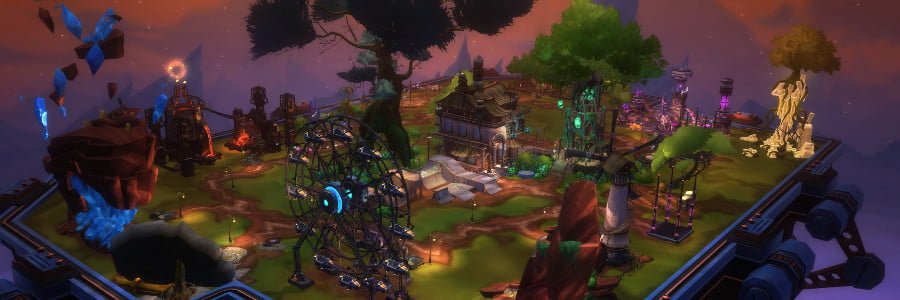
That stuff seems very approachable, very fun, and the way it’s all presented gives you a sort of feeling of expression. This game let you make so many choices presented as equal – your factions, your role in the story, the way you built your plot, the way you earned XP and resources and got around and dressed yourself and made your abilities look, when tied to a system that wants to make your character feel tangible and real as they relate to the space they’re standing in, you get expressiveness.
…But that wasn’t all that Wildstar was trying to make happen. Wildstar wanted to service the disaffected classic World of Warcraft fanbase, with the long quest chains and the grind and the slog, and they wanted to be really true to that classic World of Warcraft experience. To do any of the raids, you had to get attuned to the raids, just like back in the day.
Here’s an infamous graphic that shows you the things you have to do to unlock Attunement.
Twelve steps! Steps that can take days of work each! That’s ridiculous. If you’re a player like me, you look at this and go hell no, that’s too much work!
I mean, if the play experience is fun enough, my tune might change, I might accidentally wind up doing all those things, like back in World of Warcraft: Cataclysm, where I wound up achieving a bunch of dungeon mounts because I loved running dungeons a lot. Presented like this, though? As a laundry list of things to do, including ‘just earn a bunch of money‘? And the way it’s a sequence, so you can’t necessarily do any of it out of order? It projects such a drudge.
There are a lot of reasons to play games, and games often are made to give you different reasons to play them. Some players are explorers, some players are there to achieve, some players are there for social moments. One idea Jesper Juul forwards in Half Real is the idea of games of labour. World of Warcraft is one such game – everything the game has, whether flower picking, exploring a continent, or fighting for your life are metaphorised into repetitive, rote tasks, where everything you do is made up of long, slow processes, and there aren’t any unique moments. Everything you try, you can try again, and you can keep trying it until you get it right, and then, once you do, you can do it again to get the reward again, an attempt to flatten skill and make the game maximally approachable.
Back then, that’s what Attunement quests were about. They weren’t hard, they were arduous. The game didn’t ask you to be good, they asked you to put in the work.
I don’t think it’s impossible to wed games of labour to games of expression. But I think that Wildstar tried to do it in a way that couldn’t quite harmonise those two elements. It was a slow game in my experience – I think my month of play put me somewhere in the early teens, just early enough to unlock housing, and that’s where I stopped. It just didn’t feel interesting to keep advancing at that crawl.
The movement in combat was ultimately from a different game. You had dodges and rolls and teleports, but your combat was still made up of a rotation of attacks that take twenty to thirty seconds to dispatch enemies. Press the buttons in the right order. See those big hits in that video? Well, they represent maybe ten, fifteen percent of an enemy’s health.
I’m not saying this style of combat is bad. I’m not saying it was bad to do things this way. After all, Monster Hunter has long, slow combats where your individual hits don’t do a lot and you have to avoid making a movement mistake for ten, fifteen minutes at a time.
Here, though? I don’t think it was a good fit, not the way it was done.
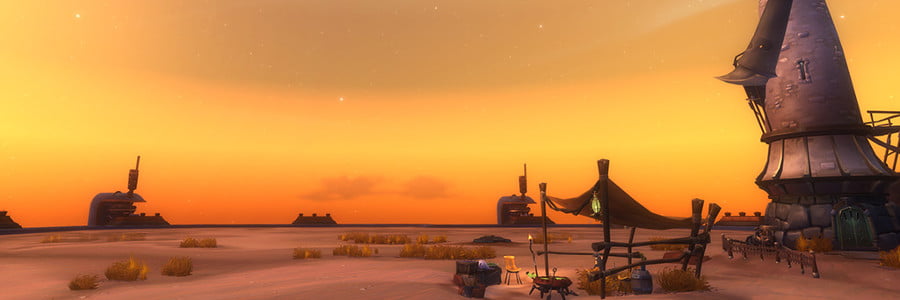
As I write this, the last hours of Wildstar are melting away. I do not love this place and I cannot make it matter to me. But there is someone out there, reading this, to whom it matters a great deal, and that it matters to you matters to me. I know what it feels like, friend and traveller, to lose this strange, special kind of home. There will be stories highlighted by tales of depression and alienation, of the game as salvation from mental health, but they do not need to be.
Today, something of you was taken from you. A community was dissolved and removed, for not being adequately financially viable.
Today, something you loved is gone.
I’m sorry, and it sucks.
